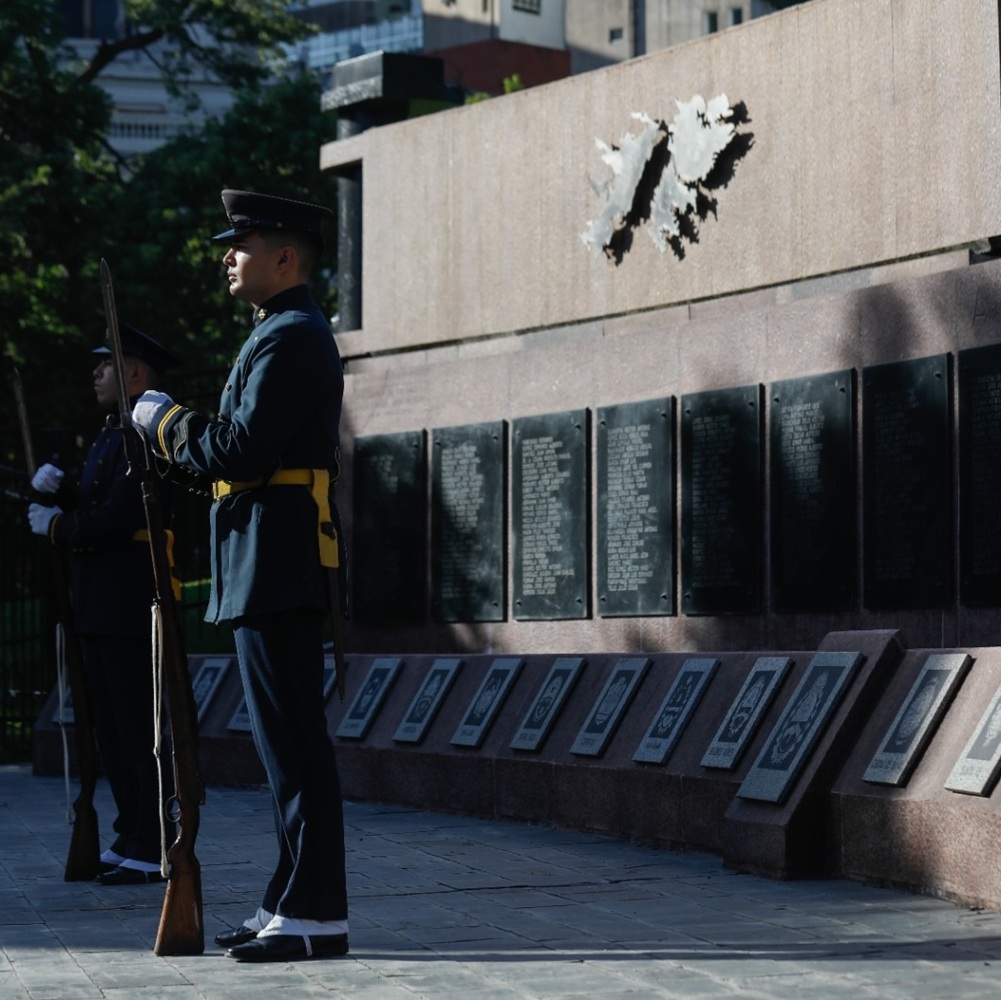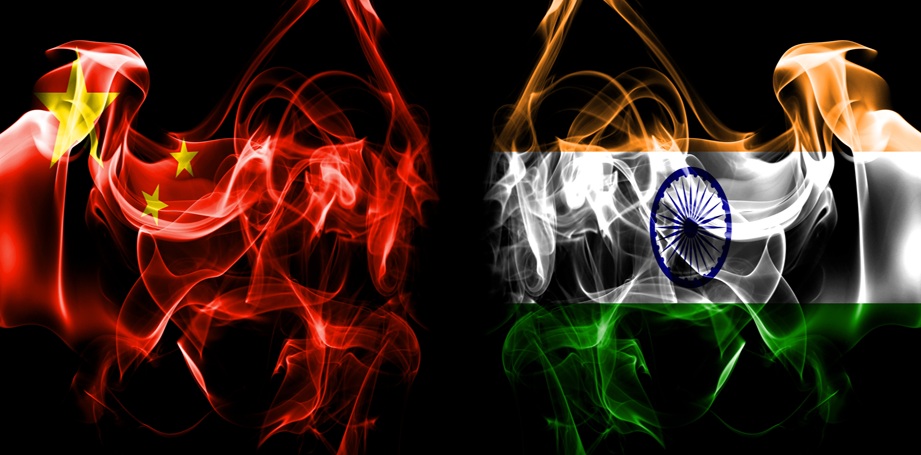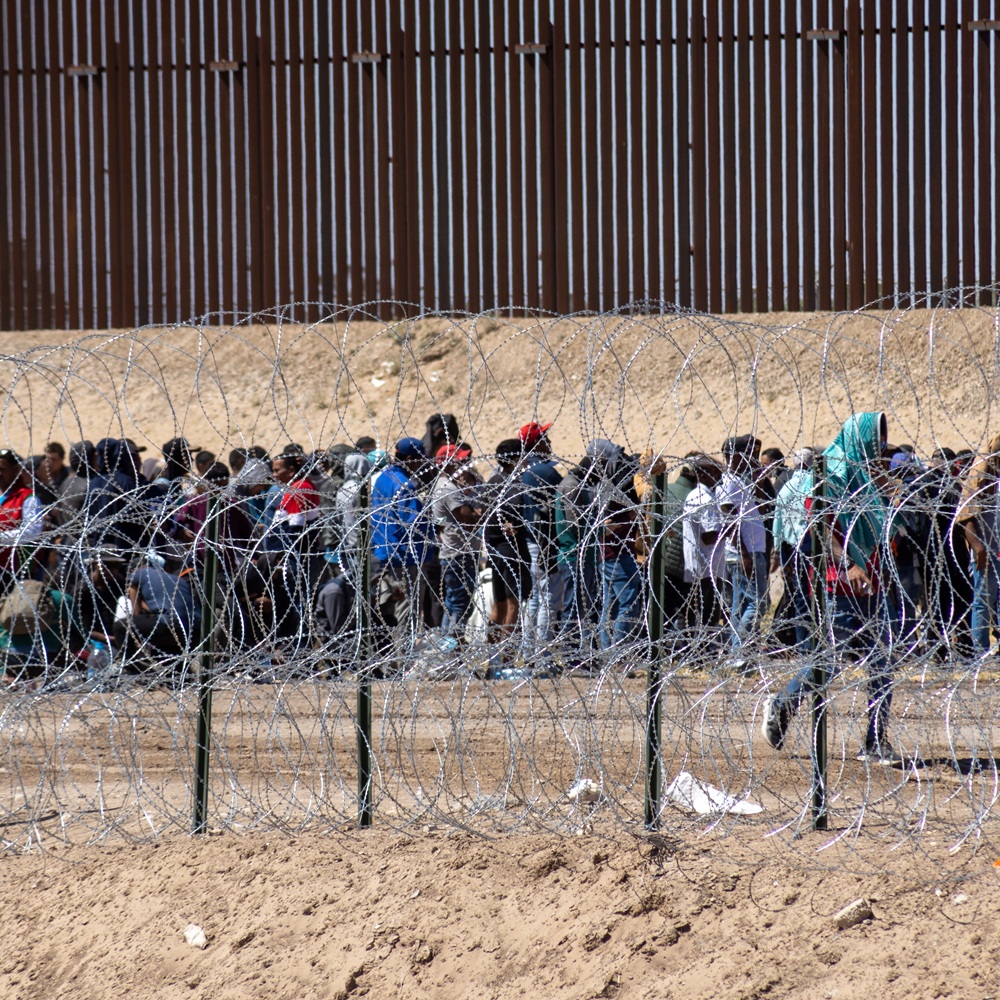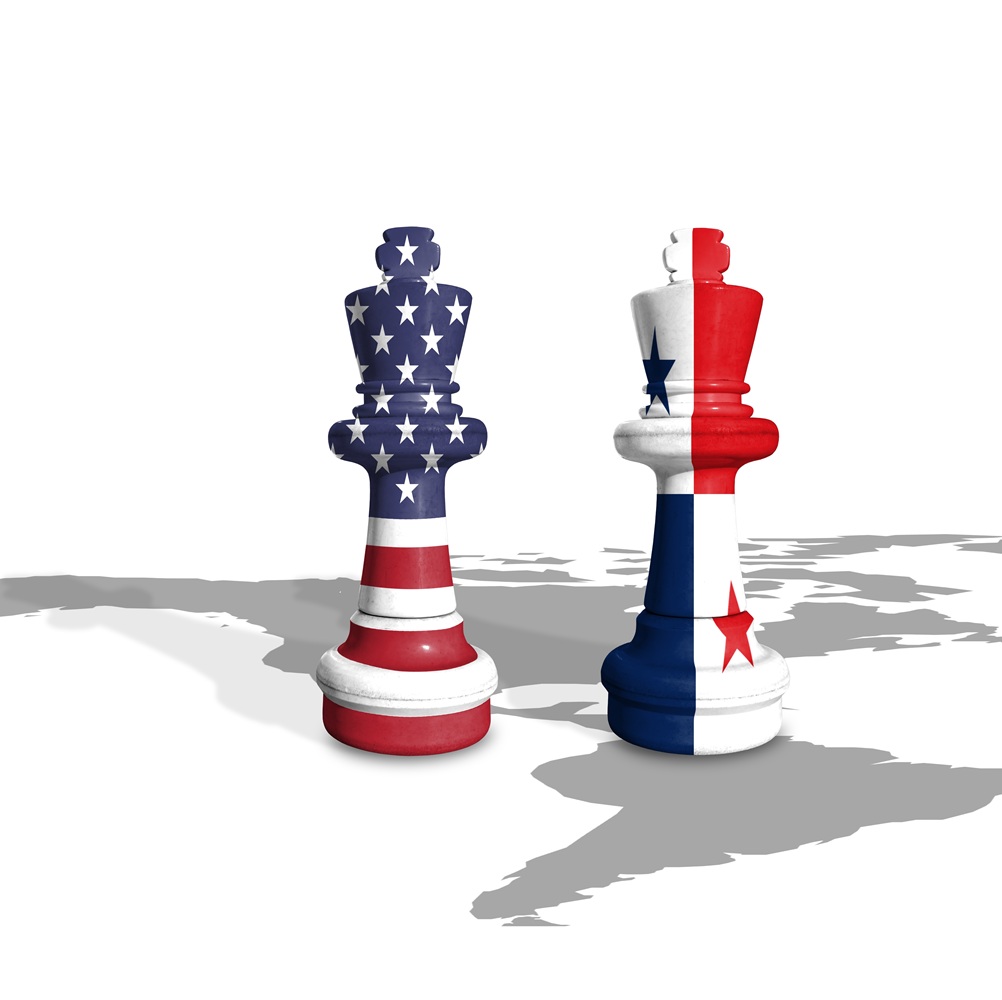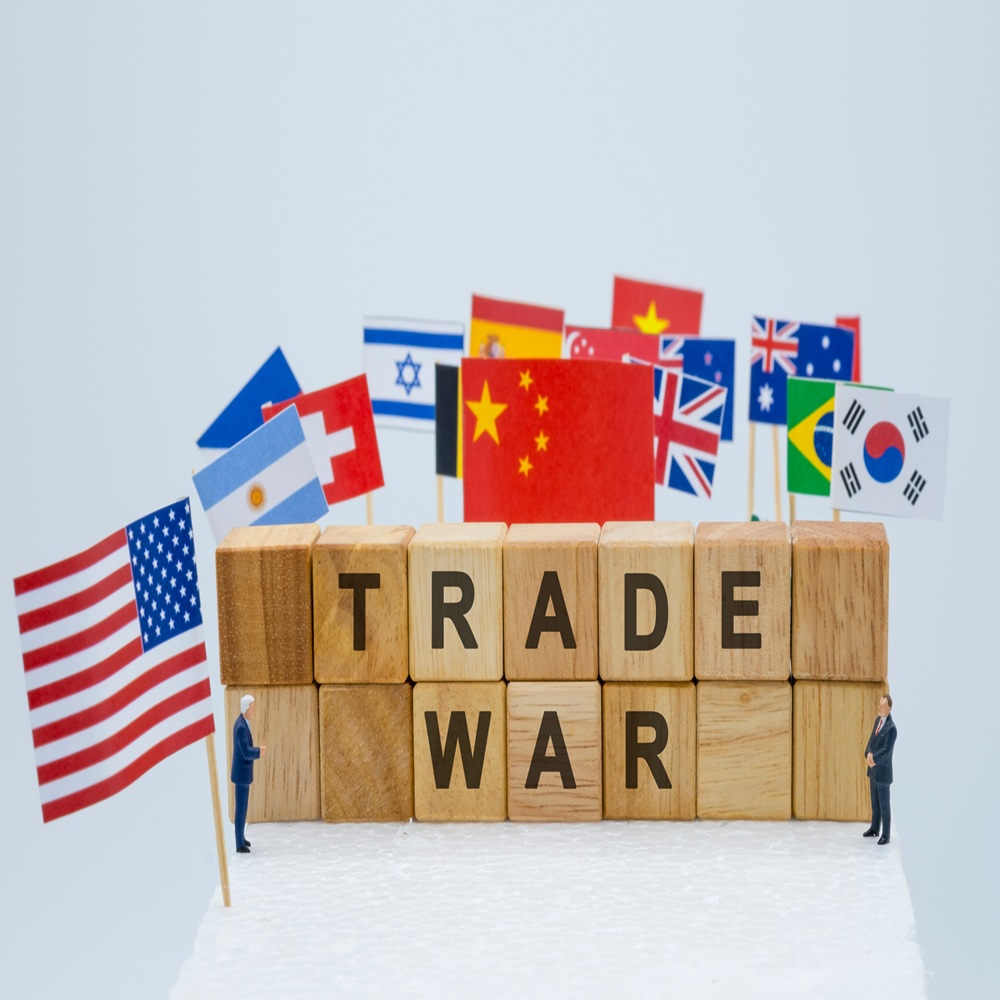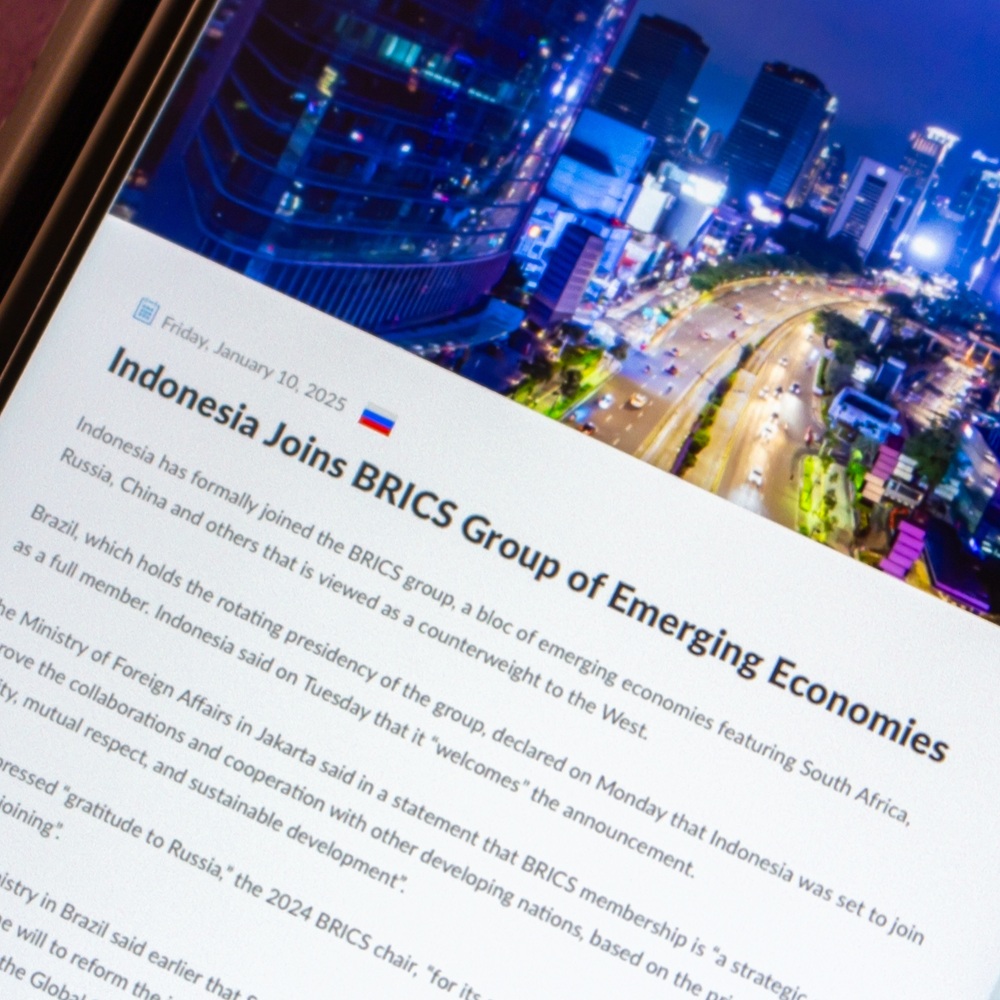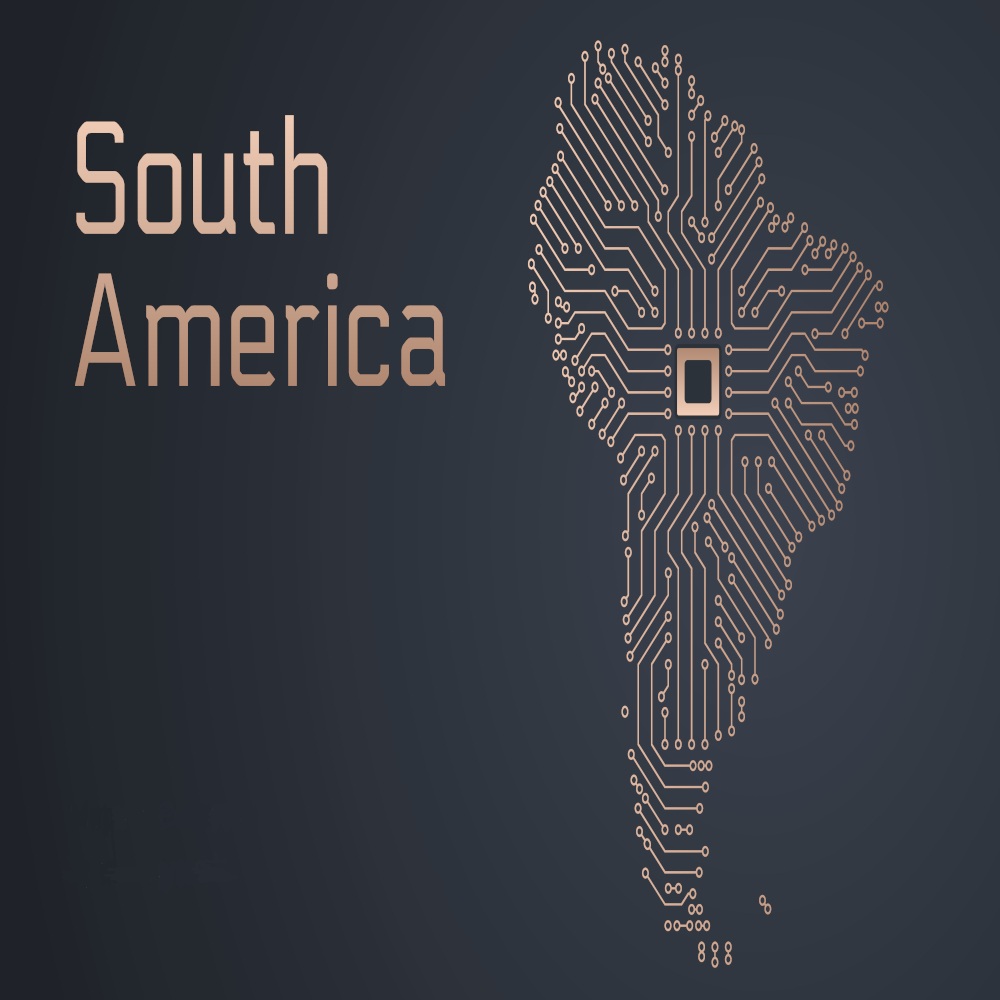
Polyglobalization, Big Tech, and Latin America, or what happens to the digital periphery when the center shifts.
by Carina Borrastero
한국어로 읽기 Leer en español In Deutsch lesen Gap اقرأ بالعربية Lire en français Читать на русском So far in the 21st century, we are witnessing the consolidation of an international division of labor in which the levers of economic, political, and technological power are increasingly decoupled from local capacities for the vast majority of nations and relocated to the international arena. The cooperative competition among oligopolistic forces vying for control of key assets to secure global hegemony—energy, finance, digital technology, logistics, military, and space—is one of the fundamental vectors of this framework. The constant expansion of these forces is rooted in the constitutive interaction between giant corporations in strategic sectors and the core states of the new poly-globalization—namely the United States and China—whose geopolitical rivalry is intrinsically linked to the success of the accumulation regime. The oligopolies and their centers of origin appropriate the market and innovation rents generated by the new productive map, accumulating a structural and relational power (in Susan Strange’s terms) that is quickly and markedly outpacing the rest. In this way, both companies and states outside these core zones are being pushed into increasingly dependent positions regarding the technologies, goods, and basic services produced by the winning oligopolies. They are, we might say, being shifted to the new extended periphery. How does this happen? What role does technology play, and where is Latin America in this story? GEOPOLITICS Today, the United States and China sit at the center, while the rest of the world occupies the periphery. UNCTAD Secretary-General Rebecca Grynspan (2023) describes the novel emergence of “centers within the periphery” as part of a process she calls poly-globalization: both China’s rise to the top ranks of global power and the consolidation of highly productive and commercial hubs in other parts of Asia challenge the sustainability of the post–Cold War unipolar world and the traditional North–South divide. Within this framework, historical peripheral dependency does not disappear, but rather changes in form and geography—especially considering that a growing number of developed countries are becoming productively and technologically dependent on countries like China, more so than the reverse (a case in point is Germany in the automotive industry; Zhang & Lustenberger, 2025). However, the periphery is not a homogeneous entity, and not all regions and countries have the same capacities or room for maneuver within this scheme, where starting points significantly shape long-term trajectories. Developed countries (formerly located at the center) remain better equipped than developing countries to face the challenges of their new condition. We can conceptualize the peripheral configuration as tiers or peripheral rings: there is no “semi-periphery”, but rather tiers or rings within the periphery. From this perspective, we might say that Western Europe constitutes a first peripheral ring (1st tier periphery), and industrialized Asia a second ring (2nd tier periphery). Latin America, in this framework, occupies a third ring: it possesses certain accumulated productive capabilities, but due to being more "distant" from the center in terms of the criticality of its production, it receives fewer benefits from integration into major global value chains in terms of investment and technological learning (as Evolutionary Economics and Latin American Development Theory have long pointed out, producing semiconductors, AI, or green hydrogen technology —as in Taiwan, India, or Germany, respectively— is not the same than assembling automobiles as in Mexico and Argentina). In this scenario, the Latin American region—historically subordinated to a single center (the North-Center)—is now subordinate to two. China has been rapidly tightening its economic ties with the region, primarily through trade and financial assistance (Dussel Peters, 2021; Ugarteche & De León, 2020; Villasenin, 2021). Chinese foreign direct investment (FDI) in Latin America and the Caribbean, for example, rose from less than 1% of the region’s total FDI in 2012 to 10.8% in 2019 (although it still lags behind investment from the US and the European Union) (Dussel Peters, 2022). The Asian giant is already Brazil’s main trading partner, is rapidly deepening its ties with Mexico, and an increasing number of countries across the continent have joined the Belt and Road Initiative, including Argentina since 2022 (the other two major Latin American economies have not joined so far). However, the benefits of these relationships for the region remain ambivalent: on the one hand, they have reduced financial dependence on the US—a significant achievement—but they have not yet translated into higher value-added development such as export diversification or upgrading. On the contrary, they have tended to reinforce the trend toward re-commoditization of local economies (Wainer, 2023; Alami et al., 2025). DIGITAL ECONOMY The current dynamics of the tech industry are particularly illustrative of the broader landscape described above, and for that reason, we take it as a focal point of observation. Google, Apple, Meta, Amazon, Microsoft, Alibaba, Tencent, and Huawei—the flagship tech giants of the US and China, commonly referred to as Big Tech (BT)—operate collectively as a global oligopoly. This formation increasingly relegates Latin America to the role of data provider and accelerates the shift of other industrial powers from technology innovators to adopters—that is, to a position of subsidiarity. To this picture we must add Nvidia, the Musk ecosystem, and DeepSeek, among other firms whose products and executives carry significant weight in the global chain of technological decision-making, beyond even their specific market shares. No country outside of the US and China has leading firms in AI, cloud computing, advanced chip knowledge, or 5G champions (with the exception of Ericsson in the latter sector, which remains Swedish. It’s worth noting that Nokia is not included here, as although its production and brand profile are still centered in Norway, the largest shareholding stake belongs to BlackRock). An example of an interesting yet ultimately failed challenge to Big Tech dominance in large-scale projects is the European federated cloud initiative Gaia-X (European Association for Data and Cloud AISBL, https://gaia-x.eu/about/). Originally promoted by the Ministers of economic affairs of Germany and France, Gaia-X is a non-profit international association that brings together companies, state agencies, and third-sector organizations involved in European industrial and technological development (such as SAP, Siemens, the Fraunhofer-Gesellschaft, or Luxembourg’s National Data Service, alongside hundreds of SMEs). Its aim is to pool capabilities in order to create a large shared cloud infrastructure that allows companies and public bodies to store and develop applications securely—that is, independent of servers located outside the continent that fail to meet European data protection standards. In short, the goal is to enable competition with US tech giants and ultimately establish a “gold standard” in data security that tends to exclude them—driven by European governments’ stated concern over the region’s digital sovereignty. The conceptually appealing strategy of combining the complementary capacities of local companies of different sizes on a single platform and offering joint products, initially acted as a carrot for the industry (over 300 members joined, up from 22 at the beginning). However, over time, even the governments most vocal about sovereignty declined to adopt Gaia-X as a primary provider: Germany, for instance, signed a €3 billion agreement with Oracle Cloud (a strategic partner of AWS, Microsoft, and Nvidia) to provide cloud services in 2024. To this day, US tech giants continue to control 70% of the European cloud market (Gooding, 2024). Gaia-X remains a valuable project with over five years of development, but with frankly limited real-world reach—also, it must be said, due in part to the tech giants’ own offensive, as they increasingly offer services aimed at the “territorialization” of data (e.g., https://www.oracle.com/cloud/sovereign-cloud/what-is-sovereign-cloud/). As things stand, the European industrial powers do not control the supply, circulation, or demand of digital technologies, and major Asian players—such as India or Taiwan—occupy intermediate links in the value chains of either the Western bloc or China, depending on the case. This kind of displacement is not so surprising when we consider the oligopolistic dynamics that currently govern the global economy, involving the leadership of core countries across all strategic sectors. Particularly in the digital economy. Oligopoly is a market structure in which a small number of firms control the supply of certain goods and/or services—that is, a large-scale market dominated by a few major sellers, who are often interconnected. Oligopolies are everywhere (in oil, automotive, telecommunications, and more), but in certain sectors, structural traits such as the hyper-scale at which production is viable and profitable, the pace of innovation required for sectoral expansion, or the relevance of brand reputation drive the formation of so-called natural oligopolies (NOs): markets in which open competition (several smaller actors producing the same and rotating their market shares over time) would tend to hinder efficient production. In these markets, the number of firms capable of minimizing total industry costs is “naturally” low, due to the high entry barriers that are established. Each NO actor holds considerable market power, allowing it to develop productive and technological capacities in a privileged way over long periods. As a result, the minimum threshold for joining the oligopoly becomes increasingly difficult for outsiders to overcome. This is the case in sectors such as the extraction of scarce and critical natural resources (like lithium), energy generation and supply (e.g., wind farms), large physical and cyber-physical infrastructure for logistics (commercial ports and oceanic bridges, 5G, or submarine internet cables), or transversal digital technologies (like AI, big data, or cloud computing). All of these require massive upfront investments, accumulated know-how, strong commercialization capacity, and the ability to retain rents—which includes “artificial” legal barriers such as intellectual property rights, trade secrets, and various mechanisms to capture innovation rents. It’s not the same to have oil reserves in your territory and develop or invite companies to exploit them (which several countries do, with companies of varying sizes) as it is to develop powerful AI models using 20 years of data from the entire public internet (which only OpenAI-Microsoft of the US originally achieved with ChatGPT, even though the data came from millions of people around the world). In fact, comparable AI capabilities have only been reached by Google’s Gemini and the open-source DeepSeek model recently developed in China following US sanctions on Nvidia chip acquisitions. In a technological oligopoly, the ability to invest and innovate at scale grants companies significant prospective power: they can pour enormous sums into R&D and start-up acquisitions to develop innovations that will pay off a decade later—after numerous failed attempts costing millions—thus shaping future markets in the process (Google, for example, has heavily invested in AI development since the 1990s and has, at times, acquired one start-up per week). Additionally, NO actors actively exclude potential competitors outside the oligopoly through more questionable mechanisms such as collusion or lobbying, among others (Borrastero & Juncos, 2024). Today, given the broad productive and geographic scope of global value chains and the extreme concentration of investment capacity typical of financial capitalism, more and more markets are becoming structured as natural oligopolies. Especially in digital technologies. Only Amazon, Microsoft, Alibaba, and Google together dominate 75% of the global cloud computing market (with respective shares of 47.8%, 15.5%, 7.7%, and 4%, according to Gartner, 2024), a sector whose relevance is crucial for the development of technologies such as generative AI. In the years leading up to the COVID-19 pandemic, Google, Facebook, Amazon, and Microsoft also became owners or lessees of more than half of the world’s submarine bandwidth capacity—a market historically controlled by states and large telecommunications companies like NEC, Alcatel, and Fujitsu, which still make up the backbone of global data traffic infrastructure (Business Research Insights, 2025). Huawei is the world’s largest supplier of telecommunications equipment, particularly for 5G networks and smartphones, holding a 28% share of the global market and over 4,000 patents (Merino et al., 2023). This helps explain Donald Trump’s insistence on making it both a material and symbolic target in the US-China trade war. The fact that Big Tech companies share technological and market domains—beyond specializing in particular niches—fuels an intense internal competitive race that, unlike monopolies, drives continuous innovation. This means that, in addition to competing to outdo one another, these firms also cooperate extensively to maintain their global leadership far ahead of the rest of the market: each company develops interoperability features to ensure their apps function properly on others’ platforms, and they share open source projects on GitHub (now owned by Microsoft), for instance. Microsoft has contributed significantly to the development of AI in China through its Microsoft Research Asia lab in Beijing and collaborations with Chinese institutions such as the National University of Defense Technology (Hung, 2025)—efforts that neither the US nor Chinese governments have blocked. Long before the current reloaded geopolitical confrontation emerged, core-country governments had already been promoting initiatives aimed at the expansion and globalization of their tech firms, such as China’s Digital Silk Road (Borrastero, 2024) or Silicon Valley itself in the US (it bears repeating just how much state R&D funding is packed inside an iPhone; Mazzucato, 2013). And what each state has done to strengthen its own technological base has ended up, in some way, benefiting the other. Consider, for example, that what China’s customs agency classifies as “foreign-invested enterprises” are mostly US-based companies, which control three-quarters of the country’s most advanced high-tech products. These include large-scale electronics exports that often involve importing key components from the US, assembling them in China via foreign companies like Foxconn (which builds Apple’s iPhones), and then exporting them. At the same time, private Chinese firms have also expanded their role in these core exports, going from virtually zero in the 1990s to over 20% today (Kenji Starrs, 2025). The offshoring of US tech production has helped the US continue leading by producing more cheaply, and has helped China learn how to lead too. As can be seen, the actors of a Global Technological Oligopoly (GTO) are deeply interdependent. To this picture, we must add the increasingly blatant symbiosis between dominant governments and individual stakeholders, as exemplified by the Trump-Musk case. We are no longer simply talking about "public-private complexes", "revolving doors" or "intimate relations". These notions describe very close ties, but between separate entities. What we are seeing now is a kind of fusion (or confusion) between a tiny handful of public and private actors who are able to govern strategic global value chains and set the rules of the game for the rest of the world. In China’s case, the country is characterized by what Weber and Qi (2022) describe as a “state-constituted market economy”: a strong state deeply intertwined with a fundamentally marketized economy, resulting in a political-economic balance that differs somewhat from Western models but still yields a global power that is difficult to challenge. In sum, we are witnessing a competition scheme designed for the very few, that generates a spiraling cycle of leveraged success in which core states play a crucial role. LATIN AMERICA A scheme like this reinforces Latin America's historic peripheral condition. GTO companies operate directly within the territory (setting up data centers, having subsidiaries, providing services, among other things), but they also rely on regional actors to amplify the generation of indigenous data, the large-scale paid consumption of BT’s technological infrastructures, and the global dissemination of their business models. The free domestic use of email applications or social networks enables data capture, but not the monetization of digital assets, whose massive volume comes from services provided to businesses and governments (as someone aptly put it, Amazon is famous for its store but rich from its servers; Lacort, 2021). In Latin America, there is a handful of large technology companies – the so-called 'tecnolatinas' – that replicate the e-marketplace, fintech, or cryptocurrency development models characteristic of the BT, managing to stand out as champions in the regional league far ahead of the rest. However, they continue to be dependent users of the fundamental technologies produced by the GTO. Mercado Libre, originally from Argentina, is the largest and most widely used digital platform on the continent, the one with the highest market value, and the first to be listed on Nasdaq. Modeled after Alibaba, it is a marketplace with an integrated online payments and credit system, technology development and service divisions, and an extensive ground-based logistics infrastructure. For its data storage and management, Mercado Libre is a client of Amazon Web Services (AWS): it processes over 40 purchases per second across 18 countries and has migrated more than 5,000 databases to Amazon DynamoDB (AWS, 2021). As of 2024, it was using nearly a dozen services from the tech giant with which it had signed an agreement to reduce its data computing costs by 13% (AWS, 2024). The other two regional champions, both Brazilian in origin, also maintain strong ties with the BTs: the marketplace Magazine Luiza runs on Google Cloud; and the fully digital bank Nubank (of Nu Holdings) is an AWS client, has received investments from Warren Buffett, Tencent Holdings and Sequoia Capital, and many of its executives have worked at Google, Facebook, Amazon, and Alibaba. The following chart illustrates the stark imbalance in market value and profits between the GTO firms, other global tech giants, and two of Latin America's top champions, in descending order: Source: Own elaboration based on data from Forbes Global 2000 (2024).* Originally in Borrastero & Juncos (2024).** Magazine Luiza is not publicly traded. Regional firms, in turn, capture data from countless Latin American users, acquire local start-ups, participate in scientific research networks, and work with governments to access tax and especially regulatory benefits—mechanisms that enable their gradual “giantization” (Borrastero & Juncos, 2024). In short, they are part of this kind of stratified oligopoly led by Big Tech, which tecnolatinas help sustain while securing their regional slice of the pie. Far from being a marginal arena, despite Latin America’s relatively low share in global cross-border data flows compared to Asia or Europe (UNCTAD, 2021), the region represents a key market to conquer. This includes sectors with crucial resources for Big Tech’s vertical integration strategies, such as lithium. For instance, Tesla is one of the main buyers of Arcadium Lithium, which operates in the salt flats of northern Argentina, and along with other tech moguls like Bill Gates, is planning new direct investments and investments in companies developing technologies related to extraction (such as Lake Resources, which works on reducing freshwater usage in lithium mining) (López King, 2025). Big Tech companies form true global ecosystems for resource capture and the monetization of informational assets, supported by states and firms across the globe. SYSTEMIC RISKS One of the main problems of the dynamics described so far is the deepening of the international division of learning which—already highly unequal—continues to grow at breakneck speed, while technological learning becomes increasingly fundamental to value creation, and peripheral states are less and less equipped to deal with ever-larger corporations. In this context, peripheral countries risk becoming mere providers of informational raw material for platforms developed in the global centers, and end up having to pay for the digital intelligence extracted from them. Meanwhile, industrial hyper-concentration makes it increasingly difficult for the market to address these structural issues on its own. Rent refers to income derived from control over a scarce and strategic asset. The oligopolistic control of such rent-generating assets by central countries drives an endogenous concentration of rent in the central regions, and the result, in terms of income distribution both between and within nations, is a deepening of inequality at all levels (UNCTAD, 2021; Milanovic, 2019; Torres and Ahumada, 2022). Another major issue stemming from the scale reached by dominant actors and the penetration of their digital infrastructures is how difficult it has become to reverse the technological path — in terms of how to generate and provide services in a different way, while maintaining the reach and quality. Just imagine, for example, trying to establish alternative global data traffic routes or to produce world-class AI for diagnosing and treating rare diseases, without at some point relying on the technological resources of the oligopoly. The key question is how societies across the globe can harness these accumulated technological capabilities for collective purposes, without depending so heavily on heteronormative political and market-driven decisions. The list of systemic risks is a long one, and there isn’t space here to delve into the broader political dimensions of the issue. But it is worth highlighting these two particular risks tied to the current techno-economic order, given their impact on the very possibility of building concrete alternatives. LOCAL INITIATIVE Latin America enjoys neither structural power (that is, the ability to shape the rules of the game in terms of production, finance, security, or the global control of knowledge and culture), nor relational power in relation to other regions with accumulated techno-productive capacities (the ability to influence other actors into doing something they otherwise wouldn’t, following Strange’s 1988 classification). This essay may lean more toward pessimism of the intellect than optimism of the will when it comes to the global order within which Latin America must forge a new place. Yet it is clear that the continent holds bargaining potential, rooted in the fact that it remains a highly coveted region for all the reasons discussed above—and many more (including the fact that it is, for now, a territory free of military wars). In the context of a “divide and conquer” logic typical of today’s intensified inter-core battles, strategies of absolute alignment with any single power are far from the wisest. The global oligopolistic economy will only deepen Latin America’s peripheral status if countries in the region fail to adopt a solidary non-alignment—or poly-alignment—approach, one that allows them to consolidate minimum thresholds of technological sovereignty. From dependent adoption to sovereign adoption (deciding what and how to adopt in order to learn), and from there to emancipation (integrating and developing what is needed for the people’s well-being). In Brazil, multiple state-led projects are underway to develop a sovereign data economy in collaboration with small and medium-sized enterprises and the academic sector (Gonzalo & Borrastero, forthcoming), along with large-scale initiatives to build national tech and energy infrastructures by leveraging the techno-productive capabilities accumulated over decades by Petrobras, BNDES, the national research council, and public venture capital funds (Alami et al., 2025). Mexico and Colombia are currently undergoing political processes inspired by the ideals of a “common home” and the care of virtual lands, advocating for continental unity on the one hand and strict regulation of Big Tech on the other (BBC News Mundo, 2025; Forbes Central America, 2025; Government of Colombia, 2024; Colombian Presidency, 2025; Wired, 2025). Argentina has a range of digital development projects based on policy frameworks designed to autonomously leverage the productive capacity the country has accumulated since the 1940s (Gonzalo & Borrastero, 2023)—though these efforts have been obstructed by the pro-Trump government of Javier Milei. EPILOGUE As these lines are being written, stock markets around the globe are tumbling amid the tariff war unleashed by the United States, forcing everyone else to adjust. Even the “Magnificent Seven” (Google, Apple, Meta, Amazon, Microsoft, Nvidia, and Tesla) have lost billions in just a few days. This raises the question of whether we are witnessing the birth of a new international economic order. Whether this is a true turning point or merely another heightened episode in the ongoing geopolitical rivalry remains to be seen. What we can already observe, however, is that global control over strategic assets for development places the GTO and core economies in a structurally advantageous position to lead long-term value chains. At the same time, the polycrisis opens up opportunities for marginalized regions to seize the momentum and assert their own demands. In financial capitalism, not everything is determined in the marketplace, and amid widespread and persistent instability, self-determination remains, without a doubt, one of the most powerful antidotes. References Alami, I., DiCarlo, J., Rolf, S. & Schindler, S. (2025). The New Frontline. The US-China battle for control of global networks. In Transnational Institute, State of Power 2025. Geopolitics of Capitalism, Ch. 2.AWS (2024). Mercado Libre acelera el time to market con servicios de la nube de AWS. Amazon Web Services. Recuperado de: https://aws.amazon.com/es/solutions/case-studies/mercado-libre-migration/.AWS (2021). Mercado Libre escala su negocio y mejora su fiabilidad al migrar 5000 bases de datos a Amazon DynamoDB. Recuperado de: https://aws.amazon.com/es/solutions/case-studies/mercado-libre-dynamodb/.BBC News Mundo (2025). Plan México: cómo es el ambicioso proyecto de Claudia Sheinbaum para colocar a su país entre las 10 principales economías del mundo. BBC News Mundo, 15 Enero 2025. Recuperado de: https://www.bbc.com/mundo/articles/cre8ze0dvdno.Borrastero, C. (2024). Estado, empresas y factores geopolíticos en el sendero de desarrollo de las redes 5G en Argentina. Estudios Sociales del Estado, 10(19), pp. 104-138.Borrastero, C. y Juncos, I. (2024). El Oligopolio Tecnológico Global, la periferia digital y América Latina. Desarrollo Económico, 64(243), pp. 110-136.Business Research Insights (2025). Submarine Cable Market Size, Share, Growth and Industry Analysis, By Type (Impregnated Paper Insulated Cable, Oil-filled Cable), By Application (Shallow Sea, Deep Sea), and Regional Insight and Forecast to 2033). Retrieved from: https://www.businessresearchinsights.com/market-reports/submarine-cable-market-121770Dussel Peters, E. (2022). Capitalismo con características chinas. Conceptos y desa-rrollo en la tercera década del siglo XXI. El Trimestre Económico, 89(354).Dussel Peters, E. (2021). Monitor de la OFDI China en América Latina y el Caribe 2021. Recuperado de: https://www.redalc-china.org/monitor/images/pdfs/menuprincipal /DusselPeters_MonitorOFDI_2021_Esp.pdfForbes Centroamérica (2025). Petro aboga por la colaboración entre países ante tensión entre multilateralismo y soledad. Forbes Centroamérica, 9 Abril 2025. Recuperado de: https://forbescentroamerica.com/2025/04/09/petro-aboga-por-la-colaboracion-entre-paises-ante-tension-entre-multilateralismo-y-soledad.Gartner (2024). Gartner Says Worldwide IaaS Public Cloud Services Revenue Grew 16.2% in 2023. Retrieved from: https://www.gartner.com/en/newsroom/press-releases/2024-07-22-gartner-says-worldwide-iaas-public-cloud-services-revenue-grew-16-point-2-percent-in-2023Gonzalo, M. y Borrastero, C. (2025). América Latina y la “Economía de datos”: definiciones, temas de agenda e implicancias de política, en Lastres, H. y Cassiolato, J. Economia Política de Dados e Soberania Digital: conceitos, desafios e experiências no mundo, ContraCorrente, en prensa.Gonzalo, M. y Borrastero, C. (2023). Misión 7 “Profundizar el avance de la digitalización escalando la estructura productiva y empresarial nacional”. En Argentina Productiva 2030 - Plan para el Desarrollo Productivo, Industrial y Tecnológico. Ministerio de Economía de la Nación, Argentina.Gooding, M. (2024). Gaia-X: Has Europe's grand digital infrastructure project hit the buffers?. Data Center Dynamics, May 13th 2024. Retrieved from: https://www.datacenterdynamics.com/en/analysis/gaia-x-has-europes-grand-digital-infrastructure-project-hit-the-buffers/Grynspan, R. (2023). Globalización dislocada: Prebisch, desbalances comerciales y el futuro de la economía global. Revista de la CEPAL, 141, 45-56.Gobierno de Colombia (2024). Estrategia Nacional Digital de Colombia 2023-2026. Recuperado de: https://www.mintic.gov.co/portal/715/articles-334120_recurso_1.pdf.Hung, K. (2025). Beyond Big Tech Geopolitics. Moving Towards Local and People-Centred Artificial Intelligence. In Transnational Institute, State of Power 2025. Geopolitics of Capitalism, Ch. 10.Kenji Starrs, S. (2025). Can China Challenge the US Empire?. In Transnational Institute, State of Power 2025. Geopolitics of Capitalism, Ch. 6.Lacort, J. (2021). Así es como gana dinero Amazon: cada vez más nube y un futuro de producciones audiovisuals. Xataka, 3 Febrero 2021. Recuperado de: https://www.xataka.com/empresas-y-economia/asi-como-gana-dinero-amazon-cada-vez-nube-futuro-producciones-audiovisuales-1López King. E. (2025). Litio: Argentina pudo unir a Elon Musk y a Bill Gates en una inversión clave en la que ambos coinciden. Litio.com.ar. Recuperado de: https://litio.com.ar/litio-argentina-pudo-unir-a-elon-musk-y-a-bill-gates-en-una-inversion-clave-en-la-que-ambos-coinciden/Mazzucato, M. (2013). The Entrepreneurial State: Debunking Public vs. Private Sector Myths. London: Anthem Press.Merino, G., Bilmes, J. y Barrenegoa, A. (2023). Economía en el (des)orden mundial: Ascenso de China, estancamiento del norte global y nuevo paradigma tecno-económico en disputa. Instituto Tricontinental de Investigación Social, Cuaderno 5.Milanovic, B. (2019). Capitalism, Alone. The Future of the System That Rules the World. Harvard University Press.Presidencia de Colombia (2025). Intervención del Presidente Gustavo Petro Urrego durante la plenaria IX Cumbre de Jefas y Jefes de Estado y Gobierno de la Comunidad de Estados Latinoamericanos y Caribeños (CELAC), Tegucigalpa, 9 de Abril de 2025. Recuperado de: https://www.facebook.com/watch/live/?ref=watch_permalink&v=1727297164867599Strange, S. (1988). States and Markets. An introduction to International Political Economy. Pinter Publishers, London.Torres, M. y Ahumada, J. M. (2022). Las relaciones centro-periferia en el siglo XXI. El Trimestre Económico, LXXXIX (1), 53, 151-195.Ugarteche, Ó. y De León, C. (2020). El financiamiento de China a América Latina. http://www.obela.org/analisis/el-financiamiento-de-china-a-ame¬rica-latina#:~:text=EnLatinoaméricaexisten4sucursales,en Brasil%2C Chile y PerúUNCTAD (2021). Digital Economy Report 2021. Cross-border data flows and development: For whom the data flow. Recuperado de https://unctad.org/publication/digital-economy-report-2021.Villasenin, L. (2021). Las oportunidades de América Latina en su relación con China en el siglo XXI. Interacción Sino-Iberoamericana / Sino-Iberoamerican Interaction, 1(1).Wainer, A. (2023). ¿Un puente al desarrollo? Cambios en el comercio de América Latina con Estados Unidos y China. Problemas del Desarrollo. Revista Latinoamericana de Economía, 54(213).Weber, I. & Qi, H. (2022). The state-constituted market economy: A conceptual framework for China’s state–market relations. Economics Department Working Paper Series, 319, University of Massachusetts Amherst.Wired (2025). Claudia Sheinbaum propone aumentar los impuestos a plataformas como Google, Netflix y Amazon en México. Wired.es, 17 Febrero 2025. Recuperado de: https://es.wired.com/articulos/claudia-sheinbaum-propone-aumentar-los-impuestos-a-plataformas-como-google-netflix-y-amazon-en-mexico.Zhang, Y. & Lustenberger, U. (2025). Balancing Protectionism and Innovation: The Future of the European Automotive Industry in the Age of Chinese Electric Vehicles. Singularity Academy Frontier Review, #20250219.









